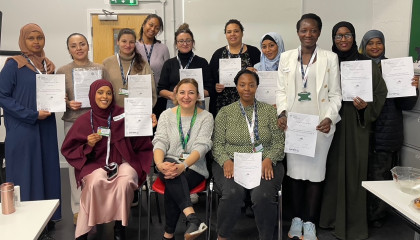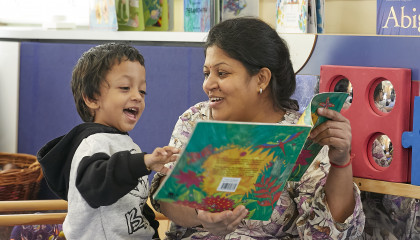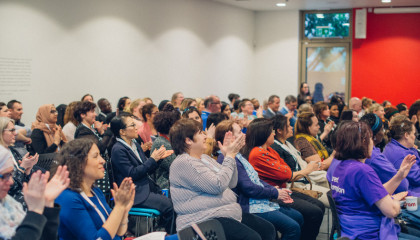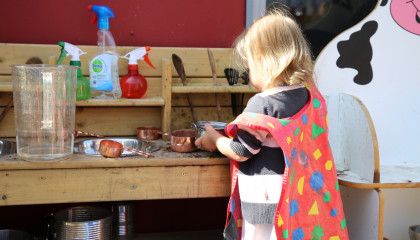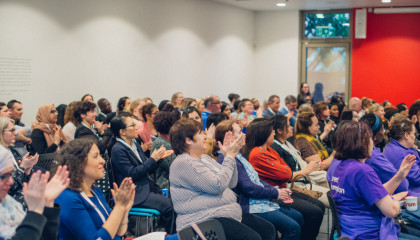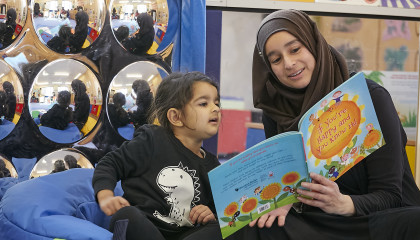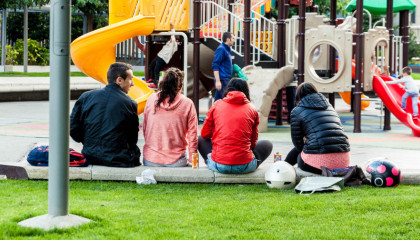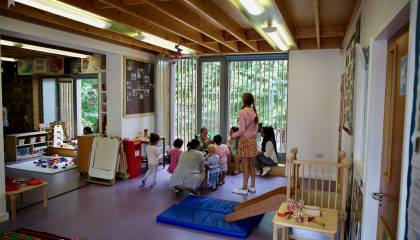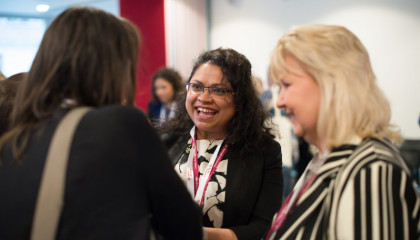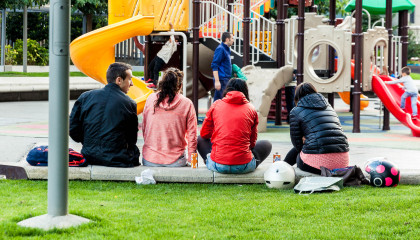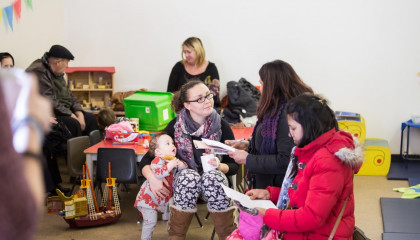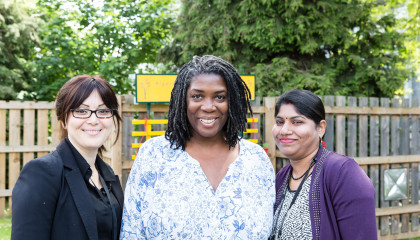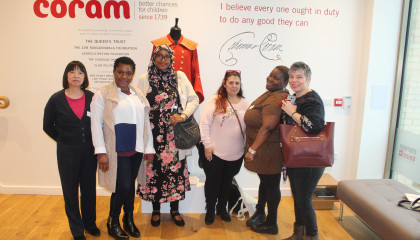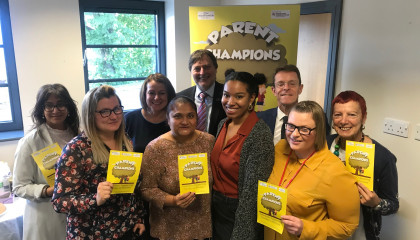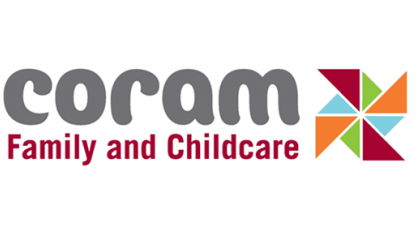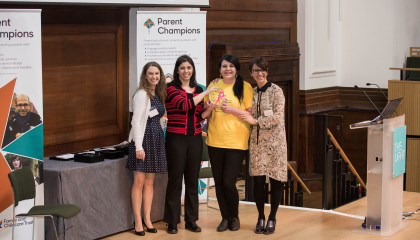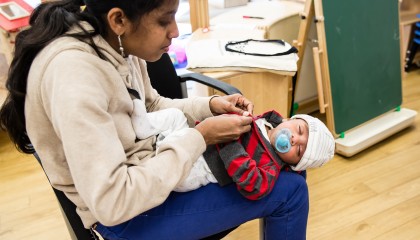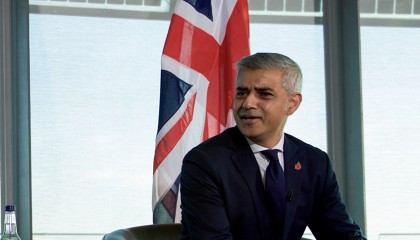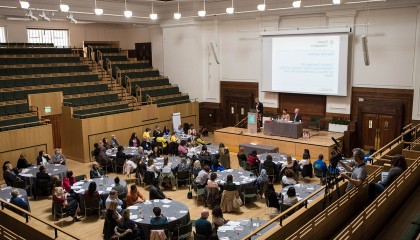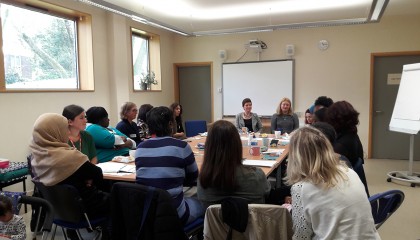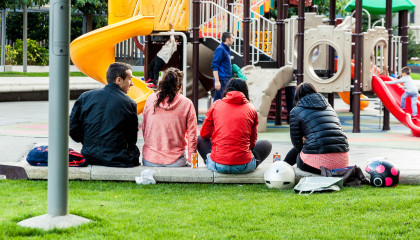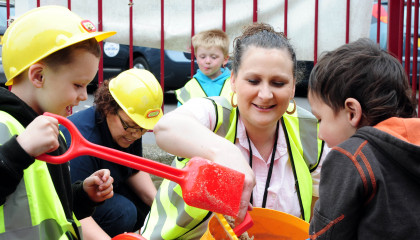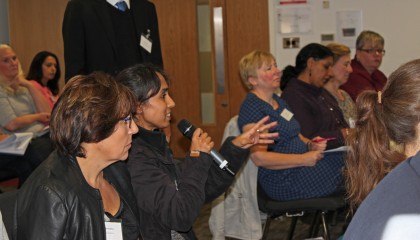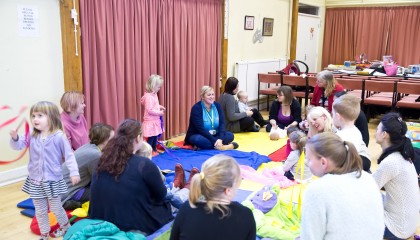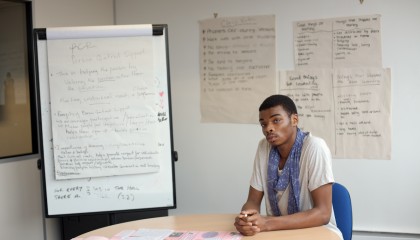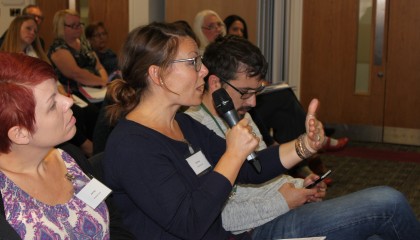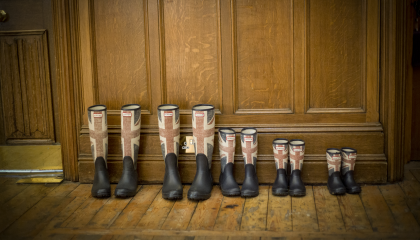You are here: 21 things we've learnt
This year, we are proud to celebrate the 21st birthday of our annual Childcare Survey. Our high-quality data provides the country's most comprehensive picture of childcare costs in Britain, and has been used widely by both academics and decision makers since 2001. This important milestone marks over two decades of extensive research, collaboration and campaigning for more accessible provision.
In this new blog, we look back at 21 lessons we have learnt since the publication of our first ever report and reflect on how these insights can help us to drive practical change in the future. Here's to the next 21 years!
1. Childcare is too expensive
Perhaps it comes as no surprise that this is first on our list. Year in, year out, the Childcare Survey finds that parents are being frozen out of employment by high prices. When the cost of going to work is prohibitively expensive, both children and their parents miss out on vital opportunities to thrive. As the cost of living continues to rise, we are concerned that childcare costs are placing more financial pressure on families already struggling to make ends meet amid soaring food and energy bills.
The UK has the third most expensive childcare system in the world according to recent data from the OECD. We need to reform the childcare system to make it more affordable for families.
2. Childcare supports children's development
We know that the early years are pivotal to giving young children the best start in life. High-quality childcare offers a fun, safe and stimulating environment to learn, play and socialize with peers. This potential boost to children's outcomes in early education lasts all the way up to GCSE level and can play a vital role in narrowing the achievement gap that opens up for disadvantaged children before they start school.
When childcare is expensive and difficult to access, children miss out on a range of valuable benefits to their development. The positive impact of childcare on educational attainment is too often overlooked in media conversations on the subject, which are more likely to focus on childcare solely as something that enables parents to work and allows flexibility. We want to see the early years at the heart of the roadmap to 'build back better' post-pandemic.
3. Quality matters
Our work over the last 21 years has shown us that the wonderful benefits of early education mentioned above come with one important caveat - the provision must be high-quality. Yes, childcare can offer a fantastic to boost children's outcomes, providing that it is delivered well. This is an important factor for parents to bear in mind when looking for suitable childcare and we have created a helpful guide on what to look for when visiting a childcare setting to make sure it is right for your child.
The COVID-19 pandemic has presented major challenges to provider sustainability within the sector over the last two years. In order to keep the quality of provision high, we want to see a well-funded system of government support to help providers to deliver an excellent standard of early years provision that helps children to thrive.
4. Childcare can help to tackle poverty
Evidence suggests that publicly funded childcare can help reduce poverty in two key ways:
a) High quality early education and effective early intervention can act as protective factors for children against the negative effects of poverty, improving long-term developmental and employment outcomes;
b) access to flexible, affordable childcare can reduce pressures on family income and help parents to participate in work, education or training, reducing a family’s shortand long-term poverty risks.
The UK childcare system currently falls short of fulfilling this potential to help reduce poverty but we partnered with the Joseph Rowntree Foundation back in 2016 to provide a blueprint of how this could work in our report, 'Creating an anti-poverty childcare system'.
5. Childcare is important for gender equality
Women are more likely to suffer professionally and financially from the consequences of expensive childcare costs and patchy availibility. The 'motherhood penalty' demonstrates how women pick up the majority of unpaid labour and caring responsibilities within British households. This has a detrimental impact on their careers and opportunities, in both the short and long term.
Making the system more accessible and affordable has the potential to bolster gender equality and give women the freedom they need to work, study and create. At the beginning of the women’s liberation movement, childcare was central to the agenda and feminist activists in Britain demanded free 24-hour nurseries as a fundamental right. This call for universal provision, issued in the 1970s, might appear overly ambitious to us now but is a useful reminder of the original feminist vision for childcare and its importance for advancing women's opportunities.
6. Where you live counts, or 'Location, Location, Location!'
Every year our Childcare Survey reveals that price and sufficency vary significantly across the country. For example, in 2022, the price for 25 hours of nursery childcare for those aged under two is 50 per cent higher in inner London (£183.56) than in Yorkshire and Humberside (£122.17). In the East of England, only 29% of local authorities report having enough childcare for children under two, while the figure was 100% for the North East.
These regional disparities mean that families face a 'postcode lottery' when looking for provision, which risks unfairly tilting the playing field based on address.
7. The current system is confusing and misunderstood
Although research reveals that the free early education entitlements has a positive impact, many eligible families do not take it up due to a number of misconceptions. There are seven different ways families can get help with childcare in England alone, and many parents find it difficult to find out what is available to them. Parents tell us that a lack of straightforward information can mean they do not know they are eligible for support or they do not know how to find a funded place.
A myriad of different, well-intentioned schemes have been layered on top of each other to create a system that is overly complex and poorly understood. Better value for money could be achieved by bringing together all these different schemes into one simple, progressive system that is easier to navigate.
8. Information is vital
Clearing up the information families have about what childcare support they are entitled to is key to helping families take up childcare. Luckily, there are a number of ways to help address misconceptions. For example, Family Information Services are essential in giving families the information they need to find out about childcare and other services for families in their local area.
FISs also play an instrumental role in the creation of our Childcare Survey every year, by providing invaluable data about cost and sufficency in their local area. We want to take the opportunity to thank local authorities for your generous support and collaboration over the last 21 years - we couldn't do it without you!
9. Talking to other parents helps
Our established Parent Champions programme offers another fantastic solution to misinformation and is able to reach families who might otherwise miss out. Parent Champions are volunteers around the country who give up a few hours a week of their time to talk to other parents about the local services available to families. Being parents, our volunteers can chat in a more informal way and can help to build trust among parents.
Our Community Connections project, funded by the National Lottery Community Fund, also illustrated that this kind of peer support can help to overcome feelings of isolation and loneliness among parents of young children.
10. Parent voice is essential for improving services for children with SEND
Our research over the last two decades has proved that in order to enhance local services, we need to hear from parents themselves. In 2018, we worked with local authorities to find out how information about SEND childcare provision could be improved. Parents of disabled children told us that they have significant concerns about leaving their child as result of more complex needs and wanted to be able to access a lot of information about providers, particularly around a setting's individual experience of working with disabled children.
These priorities helped to inform peer review of information offers and identify potential areas for improvement. Parent voice and coproduction are also a key part of creating the Local Offer across the country. Both Reading FIS and Blackpool FIS, winners of the NAFIS award for Best Local Offer in 2020 and 2021, are fantastic examples getting parents involved in this important process.
11. Coproduction can help address gaps in the system
In 2020, we were commissioned by our brilliant partners Small Steps Big Changes to deliver a consultation with fathers living in Nottingham City to increase understanding of their needs. We found that although fathers were largely satisfied with local services, they often felt overlooked. They felt that services were primarily intended for mothers and that they would have valued more support with their mental health upon becoming a new parent.
These findings were used to inform the design of services and address gender gaps in local provision. This commitment to coproduction identified practical areas of action to offer additional support and make provision more inclusive.
12. Early years staff need more support and recognition
The COVID-19 pandemic highlighted just how crucial the early years sector is, enabling key workers to keep working throughout mutliple lockdowns. However, the pandemic also revealed that much more needs to be done to recognize this invaluable work with better government protection, support and better pay. Nursery workers were forced to continue working in unsafe environments without PPE, testing or priority access to vaccines.
Writing in The Guardian last year, Christina Berry described how "early-years workers are being simultaneously treated as indispensable and disposable. They are being asked to shoulder huge burdens for the sake of society, yet given no protection and paid less than a living wage...If this sector is so vital, why is it treated so shabbily? Part of the answer lies in the systematic undervaluing of care work."
13. The system needs to extend childcare support to parents who train or study
Supporting parents to increase their qualifications and employability can have significant positive impacts for families. However, the current system does not extend 30 hours provision to parents in education or in training. This is a missed opportunity, given that evidence proves that those with higher skill levels tend to earn more, have improved job security and are less reliant on benefits. Without childcare support, parents of young children are unable to reap the rewards of training and studying.
The Government estimate that the 30 hour entitlement costs £695 million per year above the cost of the universal 15 hour entitlement. Our team estimated that adding the entitlement for parents in training increases this by 8 per cent and would cost £57 million per year. This is a valuable investment for both parents and their children for the future.
14. Universal Credit must be reformed to give more support with childcare costs
Childcare costs now significantly exceed the caps on the monthly amounts reimbursed through Universal Credit. To give parents genuine choices about whether and how much to work, it is essential that these caps reflect the true costs of childcare. The caps should not be based on the average cost of childcare nationally but instead the highest costs a parent could reasonably be expected to pay.
Childcare providers also typically ask for a deposit and the first month’s bill to be paid upfront to cover their costs and protect them from bad debt. This payment will need to be made before the child starts childcare and so also before the parent starts work or has been paid. This acts as a significant cost of taking up work or increasing hours and so is likely to deter some parents.
15. The school holidays are a logistical dilemma
For many parents, the school holidays usher in another set of challenges. Juggling working life with caring responsibilities during the long summer period is a particularly complex task and many families will rely on a combination of annual leave, holiday clubs and informal childcare from friends and family to see them through.
In 2021, our Holiday Childcare Survey found that a third of local authorities (33%) reported that there is not enough childcare for parents who work full time in their local area. When holiday places are expensive and difficult to find, children are more likely to miss out on this crucial opportunity to make friends and learn over the summer before term starts.
16. We need to reframe conversations about childcare
We need to remain attentive to the fact that childcare is incredibly valuable work and must be recognized as such. In Grazia, Head of CFC Megan Jarvie called for a shift in how we talk about provision: "nurturing and caring for our children is not just a commodity. It is a social good that helps children to learn and thrive. It is part of our infrastructure that allows parents to go out to work.
"Treating childcare like something we buy and sell on a price comparison website means that it can’t fulfil its potential to change the lives of both children and parents. Instead, we end up with a system where childcare professionals are underpaid, quality is not a top priority, and where parents can face astronomical prices.”
17. Demands for childcare reform are being overlooked
We were disappointed by the recent news that the UK government has rejected calls for an independent review of childcare funding and affordability. In its response to the committee, the Department for Education said the need for a review had been debated twice and while the government “recognised the need for ongoing collaboration and discussion on the issue” it had been “collectively concluded that a formal review is not needed”.
The policy landscape surrounding childcare has reached an impasse and is lacking the political will required to make change. We want to see the need for reform taken seriously by government so that more families can access the benefits and flexibility early education has to offer.
18. Covid-19 has magnified inequalities within the system
COVID-19 has placed unprecedented demands on the English early education and care system, potentially exacerbating longer term weaknesses in the system’s ability to consistently deliver high quality and equitable services.
Our research as part of the Covid and Childcare project has found that children with additional needs, from single parent families, disadvantaged areas, from low-income households and with disabled parents were most likely to miss out on early education and childcare during the pandemic.
19. Providers are stretched
The childcare sector is facing challenges in sustainability due to the impact of the pandemic and funding shortfalls. Over the last few years, the Childcare Survey has found local authorities reporting that more providers are having to increase the number of children looked after by each staff member.
20. Collaboration is crucial
We know that having conversations with our partners in the sector is instrumental to building a better system. To celebrate 21 years of our research and reflect on the future, we are bringing together experts from Early Years Alliance, Pregnant Then Screwed and Young Women's Trust. Join us on Thursday 24 March to get involved.
21. Change is possible!
Despite the significant challenges facing British parents, we remain committed to the possibility of real change to make the system work better for families. The history of childcare policy in the first two decades of the twenty-first century, particularly with the introduction of state-funded entitlements to help disadvantaged children, reminds us that government, campaigners and parents can work together to make real change.
We are pleased to see lots of important calls for change emerging from the sector, including Grazia's recent petition, The Juggle, and Pregnant Then Screwed's new early years campaign. We must all fight against this policy impasse and work together to help Britain transition into a new era of more inclusive, accessible and affordable childcare.

More from our blog
Sign up to our newsletter
Get the latest news, research and resources from Coram Family and Childcare


